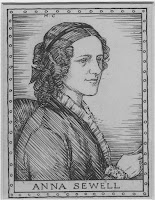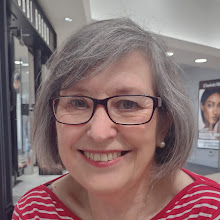 Boudicca, Warrior
Queen of the Iceni. [1st century] Her husband had been a King over East Anglia,
and the occupying Romans had allowed him to be a ‘client king’. When he died, the
Romans confiscated his lands, as there was no male heir. so Boudicca, his widow
objected. She was flogged, and forced to watch her young daughters brutally raped.
So she raised an army of 100,000 and led them to fight the Romans in an act of
revenge. “… we must either conquer or die with glory. There is no
alternative. Though I am a woman, my resolution is fixed. The men, if they
prefer, may survive with infamy and live in bondage. For me there is only
victory or death.” I hate violence- but I admire a woman who stood up for
herself, and inspired others to fight for liberty.
Boudicca, Warrior
Queen of the Iceni. [1st century] Her husband had been a King over East Anglia,
and the occupying Romans had allowed him to be a ‘client king’. When he died, the
Romans confiscated his lands, as there was no male heir. so Boudicca, his widow
objected. She was flogged, and forced to watch her young daughters brutally raped.
So she raised an army of 100,000 and led them to fight the Romans in an act of
revenge. “… we must either conquer or die with glory. There is no
alternative. Though I am a woman, my resolution is fixed. The men, if they
prefer, may survive with infamy and live in bondage. For me there is only
victory or death.” I hate violence- but I admire a woman who stood up for
herself, and inspired others to fight for liberty.
Elizabeth Fry [1780-1845] Born in Norwich, into the prestigious Gurney banking family. They were Quakers, and she married Joseph Fry [nephew of the founder of Fry’s Chocolate] with whom she had eleven children. She was a very clever and caring woman. She worked tirelessly for prison reform – instrumental in the passing of the 1823 Gaols Act, which mandated sex-segregation in English Prisons, and female warders, to protect women from exploitation. And SO practical. When women were transported as convicts to Australia, she provided each with a small bag containing cloth, needles and threads. On the long voyage, they could sew a quilt. On arrival that quilt could keep them warm, or be sold to raise funds, or be displayed as evidence of skills. She set up shelters for the homeless and a training school for nurses [inspiring Nightingale to do the same] I respect someone who was wealthy, and could have been a ‘lady of leisure’ but felt that her Christian faith meant she should use her advantages to do good for the less fortunate.
Anna Sewell [1820-1878] Also a Quaker, she was born in Great Yarmouth. The family moved to London, where her leg was badly injured in an accident when she was 14. Walking was really painful, so she travelled everywhere in a horse drawn carriage. She became a fanatical animal lover- and joined her mother in working as an ardent abolitionist. Her brother was widowed - Anna returned to Norfolk and she helped him raise his family of seven children. She’d become increasingly conscious of the cruel way that horses were treated – forced to pull heavy loads, and kept under inhumane conditions. She wrote a book – from the horse’s point of view, describing the cruelty. The book was Black Beauty. She sold it in 1877 to Jarrolds the Publishers for £40. It was an instant success [The RSPCA endorsed this exposure of animal abuse] Anna fell ill, dying just a few months later. She is buried locally near Aylsham. The book, originally intended for adults as a protest, has become a children’s favourite. Anna cared not only for people, but for all God’s creatures, and never let her own disability hold her back. I honour her courage.
There are many other Norfolk women who made a difference - Edith Cavell, St Julian of Norwich, and more …but no space left. Their legacy should be celebrated every day, not just on Norfolk day.
PS thanks for all the kind remarks yesterday about the bears. If you are considering making one yourself please email for some tips - it may save you both time and hassle!




Hope Norfolk day is a good one for you!
ReplyDeleteThis is a wonderfully uplifting post about the strength and tenacity of women-thank you. Is your email still the one in your profile as I’d like to ask for your hints and tips! Catriona
ReplyDeleteYes, please use the email in my profile. I shall have to sit down and make a coherent list of tips now! 🐻
DeleteAll the county signs as you enter Norfolk refer to it is "Nelson's County". I know he was born there but don't think he spent much time in the county.
ReplyDeleteUnlike the women who I have chosen as Norfolk heroes!
DeleteI love the look of the little bears! Would you please email me your tips on sewing them up? Thank you!
ReplyDeleteCertainly Ruth. Please send me a message using the email link in my profile 🐻
DeleteWhat an interesting post.
ReplyDeleteOur 'Houses' at secondary school were named after four very exceptional women. I was in Curie house and the others were Fry, Nightingale and Seymour.
Is that JANE Seymour?? I'm not sure I'd have chosen her as the 4th role model...
DeleteBut to be in Curie house would have been great
DeleteIt is great that you honor the women heros! They are often forgotten.
ReplyDeleteI am afraid that I cannot think of any Norwegian heroines
DeleteI enjoyed reading about your list of heroes. :)
ReplyDeleteWho are the Local Heroes where YOU are, Bless?
DeleteI am adding Edith Cavell to your list. I did not know that about Anna Sewell. I enjoyed that book as a child.
ReplyDeleteYes EC was very important. I did a long post about her a few years ago... https://angalmond.blogspot.com/2015/08/a-nurse-who-tried-to-do-her-duty.html
DeleteOnce more I learn new things from your blog! They are three special women. I think I was most familiar with Elizabeth Fry, and the difference she made for women in prisons. There is still a long way to go for women in vulnerable situations all over the world.
ReplyDeleteIndeed there is, and it takes brave, strong women to stand up for their sisters
DeleteI loved this post and learning about these 3 women. All inspirational in their own ways! I have a very old copy of Black Beauty which i found in my Grandparents' house when clearing it out.
ReplyDeleteMy copy is my Dad's Sunday School prize from 1935!
Delete